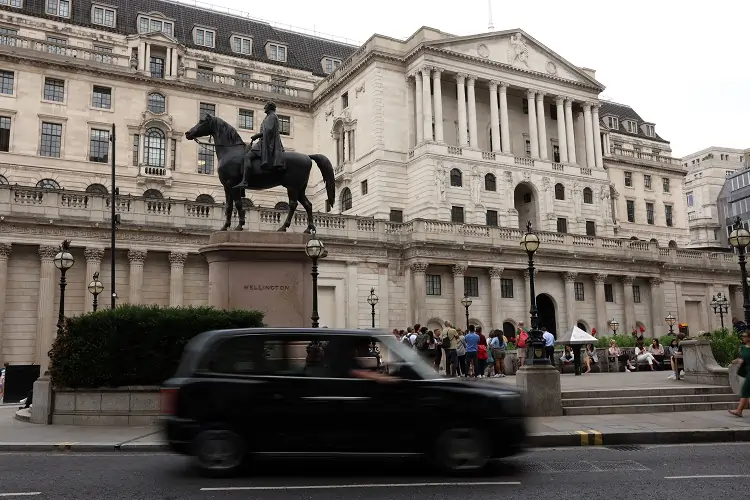
By Andy Bruce
(Reuters) – The Bank of England looks set to keep interest rates on hold on Thursday as it awaits signs that inflation risks are quashed, putting the focus instead on a decision about bond sales that could feed into Finance Minister Rachel Reeves’ first budget.
British inflation held steady in August but sped up in the services sector, which is key for the BoE, showing why forecasters expect interest rates to fall more slowly than in the United States and the euro zone.
The Federal Reserve went on Wednesday for an unusually large half-percentage-point reduction, a move that reflected “growing confidence” about the outlook for inflation, according to Chair Jerome Powell.
The BoE’s Monetary Policy Committee is likely to strike a far more cautious tone on Thursday.
All 65 economists in a Reuters poll published last week said it was likely to hold rates at 5.0%, after cutting them in August from a 16-year high of 5.25%.
Financial markets pointed to a roughly 1-in-4 chance of a cut after Wednesday’s inflation data, compared with 1-in-3 the day before.
News on price pressures has been mixed. Wage growth – another key metric for MPC members – cooled as they had expected last month and the economy stagnated in July.
But the Decision Maker Panel – a business survey favoured by the MPC – showed a downward trend in wage growth expectations has halted. Furthermore, services inflation crept up in August, albeit in large part due to volatile air fares.
Tim Graf, head of macro strategy at State Street Global Markets, said the inflation data “solidifies the belief, largely priced by markets, that the Bank of England will stand pat at (the) policy meeting”.
The consensus of economists polled by Reuters pointed to a 7-2 split in favour of holding rates. Last month, the MPC voted 5-4 to cut, but said some of the five saw the decision as finely balanced.
QT CRUNCH TIME
Bond investors are watching for Thursday’s annual decision on the pace of the BoE’s quantitative tightening programme – the sale of hundreds of billions of pounds of British government bond purchased under past attempts to stimulate the economy.
In September 2023, the MPC voted to run down the BoE’s stock of gilts by 100 billion pounds ($130 billion) via active sales and bonds maturing, up from 80 billion in the previous 12 months.
Some lawmakers have criticised the QT programme because it crystallises losses sustained by the BoE, which purchased gilts in past years at much higher prices than their current sale value. Those losses are paid for by already-stretched taxpayers.
But the BoE could announce a QT acceleration on Thursday. Around 87 billion pounds of its gilts are due to mature over the next year, leaving just 13 billion pounds for active sales.
Citi and JPMorgan expect the BoE to expand the programme to 120 billion pounds so it can keep up the volume of active gilt sales.
Francis Diamond, head of UK, euro and global inflation strategy at JPMorgan, said in a research note that market reaction to such a move would be limited.
Governor Andrew Bailey has said QT is needed to restore BoE firepower if it has to stimulate the economy with bond purchases again.
Given its impact on the state’s budget, Finance Minister Reeves will be watching Thursday’s decision. When pressed by lawmakers, she said QT was an operational matter for the BoE.
But many economists think Reeves will change the government’s fiscal rules to exclude the impact of the BoE’s QT programme. That could give her several billion pounds of extra fiscal space in her inaugural budget, due on Oct. 30, when she is under pressure to increase public spending.
The New Economics Foundation think tank said maintaining the BoE’s bond sales at the current pace would cost taxpayers just under 24 billion pounds per year until 2028/29. It said 13.5 billion pounds could be saved annually by ceasing active sales.
“The Bank of England should reflect on the value for money from such choices and the chancellor should reconcile the fact that her fiscal rules are imposing arbitrary constraints on her spending decisions,” said NEF economist Dominic Caddick.
($1 = 0.7648 pounds)
(Editing by Kevin Liffey and Jamie Freed)

